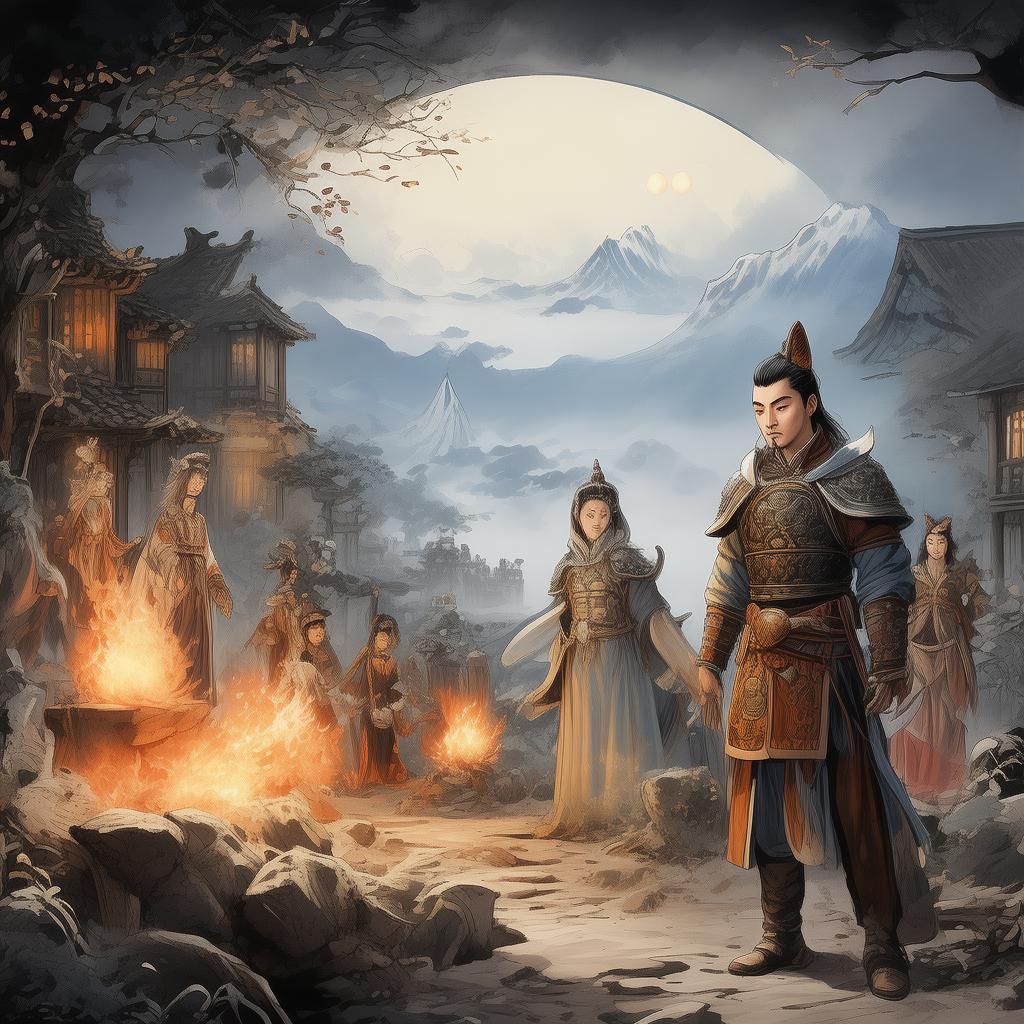The Scriptwriter's Paradox
In the bustling heart of Shanghai, amidst the towering skyscrapers and the ceaseless hum of the city, there lived a man named Li Wei. Li was an ordinary scriptwriter, his days filled with the drudgery of writing scripts that were never chosen for production. His apartment was a sanctuary of solitude, cluttered with stacks of scripts and a worn-out typewriter that had seen better days.
Li's life took a peculiar turn one rainy afternoon. As he walked back from the local café, drenched and weary, he stumbled upon an old, leather-bound book lying in the gutter. Curiosity piqued, he picked it up and discovered that it was a quire, a collection of blank pages that seemed to call out to him.
With a sense of destiny, Li began to write stories into the quire. At first, it was just a pastime, a way to escape the monotony of his life. But as he wrote, he felt a strange energy emanating from the pages. The words he penned began to take on a life of their own, weaving intricate tales that seemed to defy the laws of physics.
One night, as Li sat at his typewriter, a character from one of his stories stepped right out of the quire and into his apartment. The character, a mysterious figure named Qin, introduced himself as a guardian of the quire. He explained that the quire had the power to alter reality, and it had chosen Li to be its scriptwriter.
Li was initially skeptical, but as Qin demonstrated the quire's powers, he found himself unable to deny the truth. With a flick of his wrist, Qin showed Li that he could change the weather, create objects out of thin air, and even alter the very fabric of time. Li's eyes widened in awe as he watched the quire bring his stories to life.
However, with great power comes great responsibility. Qin warned Li that the quire could also be a dangerous tool if misused. Li was given a choice: he could use the quire to achieve his dreams, or he could destroy it and return to his ordinary life.
Li was torn. He had always dreamed of seeing his name on the silver screen, of being recognized as a great writer. But the thought of the power he now held was overwhelming. He realized that with the quire, he could write any story he wanted, but at what cost?
As he pondered his decision, Li's life began to mirror the stories he wrote. Characters from his quire appeared in his life, each with their own tales and desires. He found himself in situations that were impossible, yet somehow real. Li's ordinary life was unraveling, and he was caught in a web of his own creation.
One day, Li met a woman named Mei, who had been a character in one of his stories. She was in love with him, but he was torn between his love for her and his love for the quire. Mei's presence in his life was a constant reminder of the choices he had made and the consequences that followed.
As Li's stories became more complex, so did his life. He found himself writing a story that mirrored his own existence, a story where he was the protagonist, and the quire was his nemesis. The lines between fiction and reality blurred, and Li was no longer sure where one began and the other ended.
One evening, Li found himself at a crossroads. He had to decide whether to continue using the quire to rewrite his life or to destroy it and face the ordinary life that awaited him. He knew that destroying the quire would mean losing the extraordinary life he had created, but it would also mean regaining his sanity and his identity.
With a heavy heart, Li made his decision. He wrote a final story into the quire, a story where he destroyed the quire and returned to his ordinary life. As he wrote the last word, the quire began to glow, and the characters from his stories faded away, leaving him alone in his apartment.

Li sat in silence for a long time, reflecting on the choices he had made. He realized that the quire had given him the power to create, but it had also taken away his sense of self. He understood that the true magic of storytelling lay not in the power to alter reality, but in the power to understand and accept oneself.
In the end, Li's life returned to normal, but it was no longer ordinary. He had learned that the greatest stories are not those that change the world, but those that change the writer. And so, Li continued to write, not for fame or fortune, but for the joy of creating and the truth of his own experiences.
The Scriptwriter's Paradox was a tale of choices, consequences, and the eternal struggle between dreams and reality. It was a story that spoke to the heart of every writer, reminding them that the power to change the world lies not in the quire, but in the pen.
✨ Original Statement ✨
All articles published on this website (including but not limited to text, images, videos, and other content) are original or authorized for reposting and are protected by relevant laws. Without the explicit written permission of this website, no individual or organization may copy, modify, repost, or use the content for commercial purposes.
If you need to quote or cooperate, please contact this site for authorization. We reserve the right to pursue legal responsibility for any unauthorized use.
Hereby declared.









